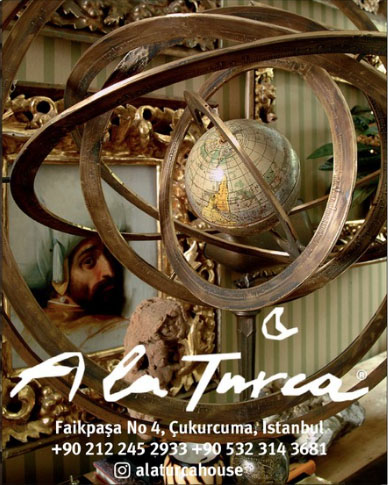Last Saturday I went to the Nardis Jazz Club in Galata to listen to the Turkish jazz singer Sibel Köse and her quartet. Having fortified ourselves with scrumptuous cakes at Şirin Fırın, a highly-recommended patisserie in nearby Büyük Hendek Caddesi, my companion and I wended our way through the crowds of selfie-taking tourists to Kuledibi Sokak, the side street just beyond the Galata Tower where the venue was located. (Readers of Cornucopia will be familiar with the Nardis Club thanks to the recent article ‘Jazz ambassadors’, by Tony Barrell – in Issue 65).
It was many years since I had heard Sibel Köse sing – the last occasion being in November 2019, just before the you-know-what took hold – and it was highly gratifying to note that her positive energy, bouncy enthusiasm and sassy stage presence have lost nothing of their oomph. If anything, they have become even more pronounced. It seemed to me that this performance – coming as it did after such a long, pandemic-induced hiatus – was her way of sticking the finger (in the nicest possible way, of course) to the intervening years of disease, confinement, economic body blows and general downness in the mouth.
I will begin by noting that the people at Nardis were kind enough to allow my companion and me to sit at a table downstairs, where we had a grandstand view of the stage, and that their demands in terms of the cost of food and drink were surprisingly modest. Thanks, therefore, go to the attentive and helpful, but never intrusive, management and staff. Even though I was perilously close to the gangway between the two groups of tables, the waiters never stepped on my toes. The only contretemps of the evening took place when one of them stepped backwards to take a selfie for a customer, only to collide karga tulumba (a Turkish expression meaning ‘crow and sack’) with an unsuspecting patron coming the other way.
The quartet accompanying Sibel Köse on this occasion consisted of Kağan Yıldız on double bass, Kürşad Deniz on piano, Berke Özgümüş on drums, and Engin Recepoğulları on tenor saxophone. The order in which I have listed these musicians is designed to highlight the fact that the double-bass player rarely receives the attention, or the applause, that her/his fellow-musicians get. Also, as I once admitted to the late Juini Booth, a double-bassist from New York, during one of his (greatly-missed) visits to Istanbul, if you ain’t got a bass line, you ain’t got nothin’. I first heard Kağan play many moons ago, when he was accompanying Sibel at the Akbank Sanat concert hall in Beyoğlu, and I was struck both by his rubber-wristed dexterity – you need that to manage the stretches on an instrument the size of a wardrobe – and by the tastefulness of his playing. He is, I believe, a product of the Mimar Sinan University State Conservatoire, where his teacher was Engin Babahan. He himself now teaches the double bass at Bahçeşehir University and the Istanbul University State Conservatoire. 2018 saw the appearance of an album entitled Timeless on which he accompanied pianist Can Çankaya.
As for Kürşad Deniz, the pianist, he started playing the blues while at Galatasaray High School, and subsequently went on to study not the pianoforte, but computer engineering, at university. It appears from his biography that as a pianist he is largely self-taught – which, given the subtlety of his playing, I find difficult to comprehend. (He himself notes that the lack among musicians of any form of prejudice against those of their brethren who do not have a university qualification in their chosen instrument was a source of encouragement – and relief – when he first took the stage at Nardis in 2003.) A regular performer with the Sibel Köse Quartet, he says he sees jazz as ‘a road that is constantly extending itself’. One wonders where his explorations will lead him. However, I doubt that he needs to learn any more chords than he knows already.
Drummer Berke Özgümüş is a graduate of the Music Department of Bilgi University – an institution through which many of Turkey’s finest jazz musicians once passed and which now, sadly, is no more. Since then he has engaged in a number of educational activities, including that of teaching drumming at the Modern Müzik Akademisi (no need to translate that one), and more recently at Bahçeşehir University. He is currently a member of a group entitled Redd. For those unfamiliar with the Turkish language, this word consists of the first four letters of the verb reddetmek, which means ‘to refuse’. What it is that he is refusing is unclear to me, but it is certainly not rhythmic accuracy, musical nous or discretion. His accompaniments are expertly designed to complement, rather than drown, the soloist’s efforts.
The first time I heard saxophonist Engin Recepoğulları was at the ‘Salon İKSV’ venue in Şişhane, Beyoğlu, where he was accompanying pianist and composer Çağrı Sertel. In my review of that concert, I remarked that ‘The music was... full of weird, incisive and sometimes downright gut-whacking chords – as if Schoenberg had been commissioned to write for the Wehrmacht.’ This was not so during the concert at Nardis, howeve. As Sibel Köse’s right-hand man (meaning that he was standing immediately to her right), his mood was considerably mellower. His interest in jazz began during his early teens: his father brought him a tenor saxophone from Russia, and he learned to play it. During his university years, he worked from time to time with legendary saxophonist Ricky Ford, who once taught at Bilgi University. (Believe me, it shows.) He then gained a scholarship to hone his musical skills in Italy. Since that time, he has played with a large number of select jazz groups, and is currently a member of the TRT Jazz Orchestra.
And so to Sibel herself. Over the three-and-a-bit years since I last had the privilege of hearing her, nothing of her energy has been lost. If anything, her singing is more powerful than ever. She hits the high notes with tremendous force and faultless intonation; she improvises creatively with nonsense words even more frequently than before, fashioning them into meaningful episodes within the song as a whole; and her emotional range remains unrivalled within my experience of jazz singers. All this is mixed in with both a searing sincerity and a wry sense of humour. How could anyone fail to enjoy and appreciate her artistry?
In ‘Come Rain or Shine’, the third item in the first set, her vibrato tone was a treat – but I felt that it was in the fourth number, ‘If You Never Fall in Love with Me’, that the concert really took off. This was in part thanks to Engin, the saxophonist, who let rip with some rapid-fire arpeggios that drew praise from the singer, and made me gawp with astonishment – I nearly swallowed the lemon in my mineral water.
‘Black Coffee’, the last number in the first set, was an exhibition of musicianship of the highest level. Deniz, the pianist, hit some excoriatingly gut-wrenching chords, Berke the drummer gave his first extended solo in a dramatic interlude, Sibel improvised with ‘wow-wow’ sounds in imitation of a muted trumpet, and the group as a whole showed an understanding of register and appropriacy that I found equal to that of a Shostakovich string quartet.
The second set began with a dainty duet between the singer and the saxophonist in ‘On a Clear Day You Can See Forever’, continued with an ultra-speedy number based on the theme music for The Flintstones, and then relaxed into a ballad or two – notably, ‘Willow, Weep For Me’ and ‘Ghost of a Chance’, which ended in whispered whimpers from the singer that brought tears to the eyes and drew enthusiastic applause from the audience. In this set, Sibel invited Simon Shiraev, a Russian guest drummer, to take over temporarily from Berke. She then left the stage while singer İldeniz Çetin, another guest, gave a hardcore performance of a slow ballad that would not have disgraced Janis Joplin. The original members of the quartet then reconvened for the finale – by which time I felt that the concert had stimulated all the receptors in my already well-satisfied cerebellum.
And so my thanks go to Sibel Köse and her fellow-musicians for upsetting the poisoned apple-cart of endemic pessimism. Doom and gloom, indeed? Kalsın (Turkish for ‘Let it remain’ – in other words, ‘No, thanks.’) What better restorative than a boat-rocking, rollicking evening’s jazz?








